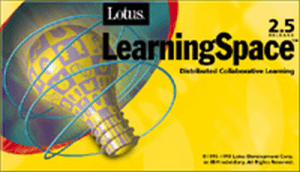 My last role at Lotus, ending in 2000 (so long ago!), was in distance learning. Having lost the leadership of the growing messaging and collaboration market as a result of a withering competitive battle against Microsoft that lasted most of the 90s, we were seeking ways to leverage the Notes/Domino application platform in areas where Microsoft had yet to establish a toehold. LearningSpace, one of the very early distributed learning platforms, was one such attempt.
My last role at Lotus, ending in 2000 (so long ago!), was in distance learning. Having lost the leadership of the growing messaging and collaboration market as a result of a withering competitive battle against Microsoft that lasted most of the 90s, we were seeking ways to leverage the Notes/Domino application platform in areas where Microsoft had yet to establish a toehold. LearningSpace, one of the very early distributed learning platforms, was one such attempt.
The nuclear war with Microsoft left us with very little powder to give distance learning the resources we needed to make distance learning idea fly. (I’ll bet very few Lotus alumni even remember LearningSpace. A pity — and one of the reasons Lotus was ultimately defeated. If it wasn’t the core Notes product, Lotus didn’t know what to do with it.)
Focused on the corporate training market, LearningSpace’s big commercial success turned out to be a university in Monterrey, Mexico. After a visit there, I came away convinced that distance learning was going to change higher education — it was going to fundamentally alter universities, students, the learning process and the economics of higher education.
I moved on — and distance learning didn’t. Sure, there were corporate training platforms and half-hearted for-profit “virtual” universities. Nothing clicked in the education marketplace. I always thought that educators didn’t really appreciate the technology and applied it to learning in artificial, stilted ways. It was another brilliant idea that just didn’t seem to work in the real world.
But things did change. And in major ways. First, new educators comfortable with tech came on the scene. Tech become more available, more democratized. Students of all ages become more adept with computing. All good things.
But for my money, two tsunami altered the landscape. Social networking for one. The collaborative technology of the 90s — focused on linking companies internally and to each other — morphed into tech designed to link individuals together outside of their work. Lots of commentary has been written about consumerization of tech and I believe that far more than low prices for hardware and Internet access, the primary driver has been social networking.
Two, higher education is (finally!) running up against the limits of inflexible demand. While many Asian parents still dream of sending their kids to an Ivy — and would gladly hock the family for decades to do so — families in the US are increasingly asking whether loading up kids with debt or raiding the retirement account is worth it.
Any parent with college-age kids knows the drill. First, the schools play hard-to-get to impressionable 17-year-olds: “We’re really selective.” Then, after acceptance, the schools turn into fierce marketers doing everything they know how to to get kids to “Choose us! CHOOSE US!” Why? It’s simple: “yield,” as it’s euphemistically called in the higher ed biz, is the revenue lifeblood of the cushy $300,000 sinecure in an ivy-encrusted university teaching or administrative post.
Put those two forces together and what do you get? edX.
edX is a collaboration of name-brand schools offering all the trappings (certificates! honor codes! assignments! exams!) of a real class experience, using social technology to the maximum to deliver coursework. For free. This new distance learning has been labelled MOOC – massively open online courses. And I think it’s the real thing. I’m signed up for an edX course starting in March — and I can’t wait.
It’s an experiment by these institutions — one that may well be about the mission of these high-zoot institutions to serve as many inquiring minds as they possibly can. From that perspective, if they didn’t try MOOC, given where we now are technologically, it would a shameful failure of that obligation.
Personally, I think edX is more Gmail than mission. Gmail, more than any other messaging tool, was successful in combining consumer messaging with a new business model. These institutions know that in a massively social world, where the expectation is that content is free, where students and parents today are questioning the value of spending a quarter of a million dollars on an undergraduate degree that they must find an alternative business model.
MOOC may well mean “model (for) ongoing operating cash.”
Sounds a little negative, I know. But I don’t mean it that way. If market forces are propelling these institutions to do what they should — really commit to educational technology on a massive scale, at low cost — well, isn’t that the guding hand working its market magic? MOOC may be about institutional self-preservation, but that doesn’t take away its potential to provide millions with the intellectual challenge of a top-flight education.
And that’s one very good thing for the whole planet.
Leave a Reply